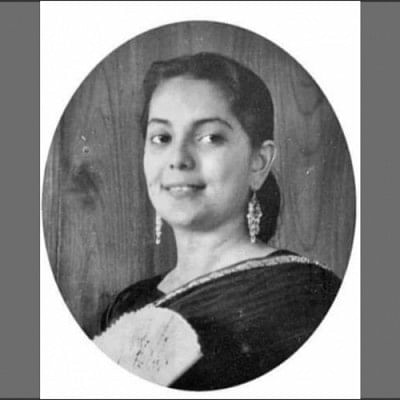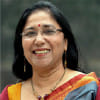Demise of an iconic scholar and activist

On March 22, Professor Emiritus Sultana Sarwatara Zaman and Sultana Apa to those who knew intimately passed away, leaving behind a host of friends, relatives and admirers to mourn her death. To me, she embodied what we as women of South Asia aspire to be, strong, courageous, principled, independent yet steeped in the positive culture, values and traditions of our society. She showed us how one can be a professional of the highest calibre yet be a loving wife, devoted mother, and doting grandmother.
Born to an eminent family of Chottogram in 1931, she lost her author mother at a young age. Her father became a Sanyasi after her mother's death and Sultana Zaman's upbringing was left to neighbours, relatives and siblings. She showed promise from a young age and excelled in her studies. She passed matriculation and HSC with distinction. Soon after she got married to Captain Nuruzzaman in 1951 and went to live in West Pakistan. Her studies was disrupted for few years as she played the role of wife and mother bringing up their three children. Her husband, Colonel Nuruzzaman, later to become Sector Commander, Bir Uttom, our most wellknown and valiant freedom fighter was her true partner as they shared a relationship of love, companionship and friendship.
Sultana Zaman went back to her studies and completed her Bachelors and then Masters in Psychology from Dhaka University in 1967 with distinction and was appointed as assistant professor at Dhaka University. In 1971 her family, Colonel Zaman, their two daughters and son joined the war of liberation. She went back to teaching at DU after the war was over. A teaching job in the most prestigious university of the country would most individuals content, but not her. She wanted to do something that would leave a lasting impact on society. She chose to devote her life to improving the lives of vulnerable people, especially focusing on children with intellectual disabilities.
In 1972 Sultana Zaman set up the Dipshikh Vidyalay for disadvantaged women and children where women were given vocational skills to become economically independent and created opportunity for street children to get education. Her desire for achieving excellence in her field of work made her seek higher studies and at the cost of great personal sacrifice she obtained a Phd degree from Emory College Georgia USA in 1975. In 1977 she established the Society for Children with Intellectual Disability. However, her most important contribution was setting up the Bangladesh Protibondhi Foundation (BPF) in 1984, a not for profit organisation with the aim of providing opportunities and inclusive education to children with intellectual disabilities. In the years that followed BPF has become recognised as the premier institute for introducing state of the art testing, screening and procedures for early diagnosis and prevention of intellectual disabilities in children.
By now Sultana Zaman realised that to sustain work and growth in the field of child intellectual disability there has to be a regular flow of trained professionals. She then founded the Department of Special Education in 1993 at the Institute of Education and Research (IER) Dhaka University. This department is credited for developing high quality human resource for the special education sectors, and continues to train hundreds of young women and men to join the profession and generate new knowledge through path breaking research and publications. For this contribution she was awarded the prestigious title of Professor Emeritus. She is one of the only two women to receive this award in the past half century. The other is Professor Emeritus Dr Najma Chowdhury for establishing the Department of Gender Studies at DU.
Sultana Zaman has received many awards such as the Rokeya Padak, the Henry Kessler award etc. Besides many other things, she will be remembered for her ability to not only conceive of an idea but bring it to fruition by galvanising and inspiring others. She has left a lasting imprint on the lives of young women in the country who aspire to go beyond the ordinary and do something extraordinary. She has been an inspiration and mentor to so many and I have been fortunate to be one of them. Most importantly, she built institutions to remain as a legacy of her extraordinary leadership qualities.
She was truly grounded in family values of bringing relatives and friends together. She built a welcoming home with her warmth and hospitality. The Friday afternoon lunches which she cooked herself were sought after by all who knew her. She loved spending time with her four grandchildren and inculcated in them love for the country and its cultural traditions. Yet, she did all this with such elegance and a matter of fact style. Along the way she mentored a host of Phd students who would often say "ish, apar moton jodi ektu hote partam" ("if only we could be a little like Apa"). To add to all this, she took to singing in her later life which gave her much joy and comfort.
Finally, she has gone and her absence will be felt by those whose lives she touched. Her students, professionals in the field, children and their parents who have benefitted from her vision of an inclusive world for children who are differently abled. She lived a full and fulfilled life and has left behind a legacy in her family, her two daughters, who have both attained excellence in their field of work. Dr Naila Khan, Professor of Child Neurology and now Director, Clinical Neuroscience Centre BPF is taking her work to even greater heights. I remember today her with deep respect, admiration and love. She was truly one of a kind, a role model whose life can be emulated by many.
Shaheen Anam, Executive Director, Manusher Jonno Foundation, is a direct student of Dr Sultana Zaman.

 For all latest news, follow The Daily Star's Google News channel.
For all latest news, follow The Daily Star's Google News channel. 



Comments